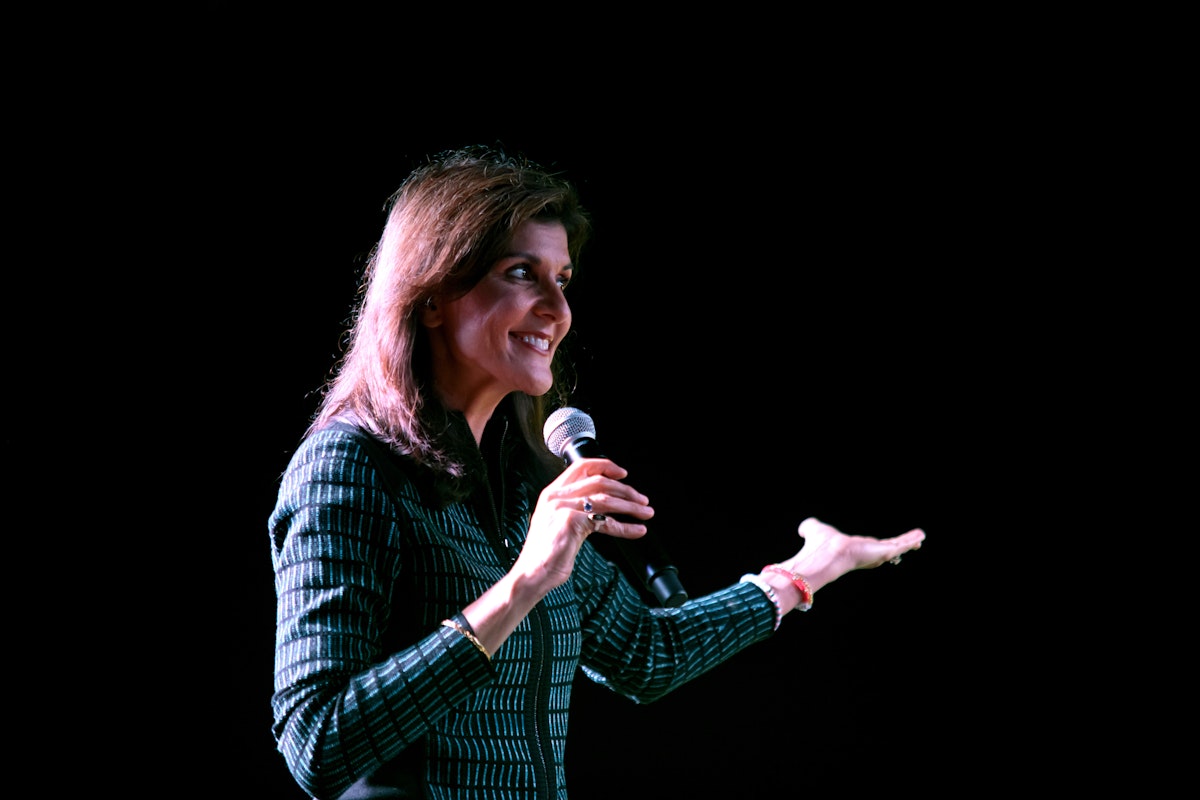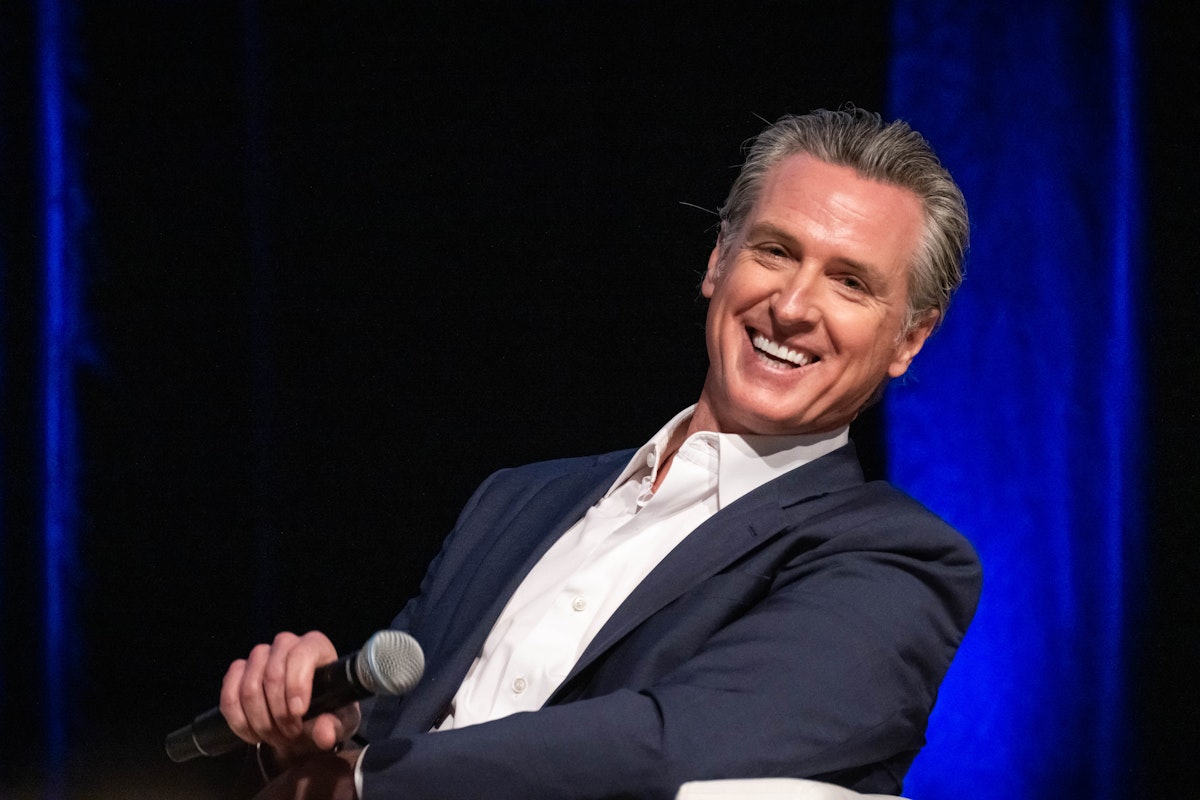Nikki Haley Finally Admits Her Campaign Was Going Nowhere
Former South Carolina Governor Nikki Haley abandoned her long-shot bid for the White House on Wednesday. Her departure makes it official: Donald Trump owns the Republican Party.The decision comes after Nikki secured only 89 delegates this entire Republican primary season, with Trump sweeping nearly every election on Super Tuesday.“I am filled with gratitude for the outpouring of support we’ve received from all over our great country, but the time has now come for us to suspend our campaign,” Haley said in a speech that pinpointed debt, socialism, and “America’s retreat” from the international stage as reasons for the country’s struggles.She then bizarrely heralded former British Prime Minister Margaret Thatcher and congratulated Donald Trump on becoming the presumptive Republican nominee come July.“Margaret Thatcher provided some good advice when she said, quote, ‘Never just follow the crowd. Always make up your own mind,’” Haley said. “It is now up to Donald Trump to earn the votes of those in our party and beyond it who did not support him.”Haley did not endorse Trump in her resignation speech Wednesday, instead urging the former president to earn the support of all Republican and independent voters.Haley was the last major Republican contender to the former president, despite polling gaps that sometimes placed Trump more than 50 percentage points ahead of her, according to aggregated polling data by FiveThirtyEight. Still, the former ambassador was able to drill a sore spot into the Trump campaign, festering insecurities in the typically boorish and bombastic GOP front-runner that took the form of fierce anti-Haley messaging.Unlike many other Republicans this primary season—especially Ron DeSantis and Vivek Ramaswamy, the last recent major contenders to drop out—Haley revealed herself as one of the few candidates willing to at least somewhat criticize Trump. Despite still promising to pardon him, she also called him a liar, questioned his mental fitness, and argued that Trump used his office to “buddy up with dictators.”She also took aim at Trump’s legal woes, blasting his victim mentality in particular. “There were a couple more court cases and a couple more judgments, and now he’s been talking about being a victim,” Haley said on Monday. “At no point is he ever talking about the American people.… All he’s doing is talking about himself.”But Haley’s run was not without controversy. In the final months of her campaign, Haley obviously struggled in her answers to placate both moderate Republicans and increasingly radical voters on the far right, even when it came to answering point-blank questions with obvious answers, like the cause of the Civil War.“I think the cause of the Civil War was basically how the government was going to run, the freedoms, and what people could and couldn’t do,” Haley said during a town hall in December, notably failing to mention slavery in a long-winded answer.In January, Haley tried to brush off that failure by playing the “Black friend” card, explaining that she “knew half of South Carolinians saw the Confederate flag as heritage and tradition” and that “the other half of South Carolinians saw it as slavery and hate.”That same month, Haley—the daughter of Sikh Indian immigrants—tried to argue that America was not and never had been a racist country, despite several passages in her 2012 autobiography, Can’t Is Not an Option, that recount apparent discrimination on the basis of her race.Regardless of her inability to wrangle her own truths to national voters, Haley’s ability to offer an intraparty alternative to Trump’s politics proved an incredible boon to her campaign. In January CBS News/YouGov matchups between the top Republican contenders and President Joe Biden, Haley came out head and shoulders above her competition, leading with 54 percent of the vote against Biden’s 45 percent thanks to support from moderates, independents, and voters with college degrees. That was a much wider margin than Trump, who was predicted to win against Biden by just two percentage points with 50 percent of the vote.Some also initially predicted that Haley would have a baked-in advantage against her primary opponent as Trump faced challenges in Colorado and Maine over his eligibility to run on the ballot due to the January 6 insurrection. But the Supreme Court threw cold water on that idea on Monday when it blocked those efforts.Ultimately, Haley proved to be the final obstacle to Trump before the former president faced down Biden again in a grueling general election rematch. And although she fought the good fight against a Republican conference that largely wanted nothing to do with her, Haley’s resignation proves that the current iteration of the GOP prefers a man who is on the line for 91 criminal charges, has been found liable for rape and defamation, and found guilty of bank fraud that was likened by a judge to Bernie Madhoff’s Ponzi scheme—over everybody else.Trump wasted little time ri

Former South Carolina Governor Nikki Haley abandoned her long-shot bid for the White House on Wednesday. Her departure makes it official: Donald Trump owns the Republican Party.
The decision comes after Nikki secured only 89 delegates this entire Republican primary season, with Trump sweeping nearly every election on Super Tuesday.
“I am filled with gratitude for the outpouring of support we’ve received from all over our great country, but the time has now come for us to suspend our campaign,” Haley said in a speech that pinpointed debt, socialism, and “America’s retreat” from the international stage as reasons for the country’s struggles.
She then bizarrely heralded former British Prime Minister Margaret Thatcher and congratulated Donald Trump on becoming the presumptive Republican nominee come July.
“Margaret Thatcher provided some good advice when she said, quote, ‘Never just follow the crowd. Always make up your own mind,’” Haley said. “It is now up to Donald Trump to earn the votes of those in our party and beyond it who did not support him.”
Haley did not endorse Trump in her resignation speech Wednesday, instead urging the former president to earn the support of all Republican and independent voters.
Haley was the last major Republican contender to the former president, despite polling gaps that sometimes placed Trump more than 50 percentage points ahead of her, according to aggregated polling data by FiveThirtyEight. Still, the former ambassador was able to drill a sore spot into the Trump campaign, festering insecurities in the typically boorish and bombastic GOP front-runner that took the form of fierce anti-Haley messaging.
Unlike many other Republicans this primary season—especially Ron DeSantis and Vivek Ramaswamy, the last recent major contenders to drop out—Haley revealed herself as one of the few candidates willing to at least somewhat criticize Trump. Despite still promising to pardon him, she also called him a liar, questioned his mental fitness, and argued that Trump used his office to “buddy up with dictators.”
She also took aim at Trump’s legal woes, blasting his victim mentality in particular. “There were a couple more court cases and a couple more judgments, and now he’s been talking about being a victim,” Haley said on Monday. “At no point is he ever talking about the American people.… All he’s doing is talking about himself.”
But Haley’s run was not without controversy. In the final months of her campaign, Haley obviously struggled in her answers to placate both moderate Republicans and increasingly radical voters on the far right, even when it came to answering point-blank questions with obvious answers, like the cause of the Civil War.
“I think the cause of the Civil War was basically how the government was going to run, the freedoms, and what people could and couldn’t do,” Haley said during a town hall in December, notably failing to mention slavery in a long-winded answer.
In January, Haley tried to brush off that failure by playing the “Black friend” card, explaining that she “knew half of South Carolinians saw the Confederate flag as heritage and tradition” and that “the other half of South Carolinians saw it as slavery and hate.”
That same month, Haley—the daughter of Sikh Indian immigrants—tried to argue that America was not and never had been a racist country, despite several passages in her 2012 autobiography, Can’t Is Not an Option, that recount apparent discrimination on the basis of her race.
Regardless of her inability to wrangle her own truths to national voters, Haley’s ability to offer an intraparty alternative to Trump’s politics proved an incredible boon to her campaign. In January CBS News/YouGov matchups between the top Republican contenders and President Joe Biden, Haley came out head and shoulders above her competition, leading with 54 percent of the vote against Biden’s 45 percent thanks to support from moderates, independents, and voters with college degrees. That was a much wider margin than Trump, who was predicted to win against Biden by just two percentage points with 50 percent of the vote.
Some also initially predicted that Haley would have a baked-in advantage against her primary opponent as Trump faced challenges in Colorado and Maine over his eligibility to run on the ballot due to the January 6 insurrection. But the Supreme Court threw cold water on that idea on Monday when it blocked those efforts.
Ultimately, Haley proved to be the final obstacle to Trump before the former president faced down Biden again in a grueling general election rematch. And although she fought the good fight against a Republican conference that largely wanted nothing to do with her, Haley’s resignation proves that the current iteration of the GOP prefers a man who is on the line for 91 criminal charges, has been found liable for rape and defamation, and found guilty of bank fraud that was likened by a judge to Bernie Madhoff’s Ponzi scheme—over everybody else.
Trump wasted little time ripping Haley apart after her announcement, writing on TruthSocial that she got “TROUNCED.”
“At this point, I hope she stays in the ‘race’ and fights it out until the end!” Trump mocked, before extending an invitation to Haley’s supporters to “join the greatest movement in the history of our Nation.”
Biden also extended an olive branch to the stranded voters, pushing a message of unity with the moderate conservative demographic.
“I know there is a lot we won’t agree on. But on the fundamental issues of preserving American democracy, on standing up for the rule of law, on treating each other with decency and dignity and respect, on preserving NATO… I hope and believe we can find common ground,” the president said in a statement.
This story has been updated.



